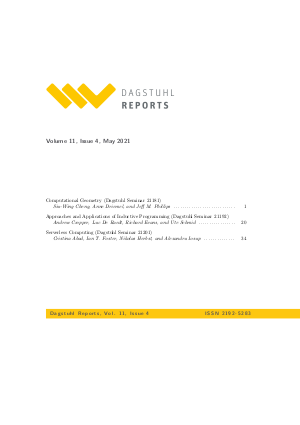Dagstuhl Reports, Volume 11, Issue 4
-
Part of:
Volume:
Dagstuhl Reports, Volume 11
Journal: Dagstuhl Reports (DagRep)

Event
- Dagstuhl Seminars 21181, 21192, 21201
Publication Details
- published at: 2021-09-16
- Publisher: Schloss Dagstuhl – Leibniz-Zentrum für Informatik
- DBLP: db/journals/dagstuhl-reports/dagstuhl-reports11
Access Numbers
- Detailed Access Statistics available here
-
Total Document Accesses (updated on a weekly basis):
0PDF Downloads
Documents
Dagstuhl Reports, Volume 11, Issue 4, May 2021, Complete Issue
Abstract
Cite as
Dagstuhl Reports, Volume 11, Issue 4, pp. 1-95, Schloss Dagstuhl – Leibniz-Zentrum für Informatik (2021)
Copy BibTex To Clipboard
@Article{DagRep.11.4,
title = {{Dagstuhl Reports, Volume 11, Issue 4, May 2021, Complete Issue}},
pages = {1--95},
journal = {Dagstuhl Reports},
ISSN = {2192-5283},
year = {2021},
volume = {11},
number = {4},
publisher = {Schloss Dagstuhl -- Leibniz-Zentrum f{\"u}r Informatik},
address = {Dagstuhl, Germany},
URL = {https://drops.dagstuhl.de/entities/document/10.4230/DagRep.11.4},
URN = {urn:nbn:de:0030-drops-154190},
doi = {10.4230/DagRep.11.4},
annote = {Keywords: Dagstuhl Reports, Volume 11, Issue 4, April 2021, Complete Issue}
}
Dagstuhl Reports, Table of Contents, Volume 11, Issue 4, 2021
Abstract
Cite as
Dagstuhl Reports, Volume 11, Issue 4, pp. i-ii, Schloss Dagstuhl – Leibniz-Zentrum für Informatik (2021)
Copy BibTex To Clipboard
@Article{DagRep.11.4.i,
title = {{Dagstuhl Reports, Table of Contents, Volume 11, Issue 4, 2021}},
pages = {i--ii},
journal = {Dagstuhl Reports},
ISSN = {2192-5283},
year = {2021},
volume = {11},
number = {4},
publisher = {Schloss Dagstuhl -- Leibniz-Zentrum f{\"u}r Informatik},
address = {Dagstuhl, Germany},
URL = {https://drops.dagstuhl.de/entities/document/10.4230/DagRep.11.4.i},
URN = {urn:nbn:de:0030-drops-154203},
doi = {10.4230/DagRep.11.4.i},
annote = {Keywords: Table of Contents, Frontmatter}
}
Computational Geometry (Dagstuhl Seminar 21181)
Abstract
Cite as
Siu-Wing Cheng, Anne Driemel, and Jeff M. Phillips. Computational Geometry (Dagstuhl Seminar 21181). In Dagstuhl Reports, Volume 11, Issue 4, pp. 1-19, Schloss Dagstuhl – Leibniz-Zentrum für Informatik (2021)
Copy BibTex To Clipboard
@Article{cheng_et_al:DagRep.11.4.1,
author = {Cheng, Siu-Wing and Driemel, Anne and Phillips, Jeff M.},
title = {{Computational Geometry (Dagstuhl Seminar 21181)}},
pages = {1--19},
journal = {Dagstuhl Reports},
ISSN = {2192-5283},
year = {2021},
volume = {11},
number = {4},
editor = {Cheng, Siu-Wing and Driemel, Anne and Phillips, Jeff M.},
publisher = {Schloss Dagstuhl -- Leibniz-Zentrum f{\"u}r Informatik},
address = {Dagstuhl, Germany},
URL = {https://drops.dagstuhl.de/entities/document/10.4230/DagRep.11.4.1},
URN = {urn:nbn:de:0030-drops-147963},
doi = {10.4230/DagRep.11.4.1},
annote = {Keywords: algorithms, computational geometry, Computational topology, data structures, Discrete geometry}
}
Approaches and Applications of Inductive Programming (Dagstuhl Seminar 21192)
Abstract
Cite as
Andrew Cropper, Luc De Raedt, Richard Evans, and Ute Schmid. Approaches and Applications of Inductive Programming (Dagstuhl Seminar 21192). In Dagstuhl Reports, Volume 11, Issue 4, pp. 20-33, Schloss Dagstuhl – Leibniz-Zentrum für Informatik (2021)
Copy BibTex To Clipboard
@Article{cropper_et_al:DagRep.11.4.20,
author = {Cropper, Andrew and De Raedt, Luc and Evans, Richard and Schmid, Ute},
title = {{Approaches and Applications of Inductive Programming (Dagstuhl Seminar 21192)}},
pages = {20--33},
journal = {Dagstuhl Reports},
ISSN = {2192-5283},
year = {2021},
volume = {11},
number = {4},
editor = {Cropper, Andrew and De Raedt, Luc and Evans, Richard and Schmid, Ute},
publisher = {Schloss Dagstuhl -- Leibniz-Zentrum f{\"u}r Informatik},
address = {Dagstuhl, Germany},
URL = {https://drops.dagstuhl.de/entities/document/10.4230/DagRep.11.4.20},
URN = {urn:nbn:de:0030-drops-147975},
doi = {10.4230/DagRep.11.4.20},
annote = {Keywords: Interpretable Machine Learning, Explainable Artificial Intelligence, Interactive Learning, Human-like Computing, Inductive Logic Programming}
}
Serverless Computing (Dagstuhl Seminar 21201)
Abstract
Cite as
Cristina Abad, Ian T. Foster, Nikolas Herbst, and Alexandru Iosup. Serverless Computing (Dagstuhl Seminar 21201). In Dagstuhl Reports, Volume 11, Issue 4, pp. 34-93, Schloss Dagstuhl – Leibniz-Zentrum für Informatik (2021)
Copy BibTex To Clipboard
@Article{abad_et_al:DagRep.11.4.34,
author = {Abad, Cristina and Foster, Ian T. and Herbst, Nikolas and Iosup, Alexandru},
title = {{Serverless Computing (Dagstuhl Seminar 21201)}},
pages = {34--93},
journal = {Dagstuhl Reports},
ISSN = {2192-5283},
year = {2021},
volume = {11},
number = {4},
editor = {Abad, Cristina and Foster, Ian T. and Herbst, Nikolas and Iosup, Alexandru},
publisher = {Schloss Dagstuhl -- Leibniz-Zentrum f{\"u}r Informatik},
address = {Dagstuhl, Germany},
URL = {https://drops.dagstuhl.de/entities/document/10.4230/DagRep.11.4.34},
URN = {urn:nbn:de:0030-drops-147982},
doi = {10.4230/DagRep.11.4.34},
annote = {Keywords: Cloud computing, Cloud continuum, data-driven, design patterns, DevOps, experimentation, model-driven, serverless computing, simulation, software architecture, systems management, vision}
}